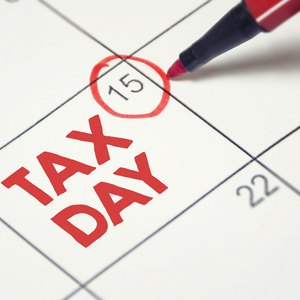
The date begins looming ominously for many taxpayers before the last winter snow has thawed: April 15. Tax Day.
Tax returns must be received by the IRS by this date or you’ll experience the agency’s wrath in one way or another…or maybe not. It’s possible under a couple of circumstances to miss the tax deadline without any negative fallout, but you’ll have to pay penalties and interest for the oversight in most cases.
The actual filing date of April 15 can be a little shifty, too, creating some confusion. For example, Tax Day was April 17 in 2018, but you can't count on those two extra days in 2020. That's because Tax Day gets bumped to the next business day when the 15th falls on a weekend or holiday, and that’s not the case in 2020.
Ask for an Extension of Time to File
The problem of missing the tax deadline is really very easy to avoid. The IRS just wants you to ask for more time. In most cases, it will automatically give you six more months to file until Oct. 15 if you just ask. All you have to do is file IRS Form 4868, and you can even submit it electronically, if you prefer. There’s no fee.
You won’t be subject to a late filing penalty if you submit the form instead of a tax return, but there’s one caveat: The IRS must receive Form 4868 by the April 15 deadline. You can’t wake up on the morning of the 16th and say “Oops!” then shoot it off to the IRS.
What Happens If You Miss the Tax Deadline?
It’s going to cost you some money if you fail to submit either a tax return or Form 4868 by April 15 – potentially a lot more than it would cost you if you simply file your return without paying any taxes you might owe. The IRS imposes a late filing penalty of 5 percent of the amount of tax you owe up to a maximum of 25 percent, and the percentage is applied each and every month until the IRS receives your return. Interest on the amount you owe will accrue, too.
Maybe you realize you owe the IRS $1,500 when you finally complete your return. The IRS will tack on $75 or 5 percent of that during the first 30 days that pass after the April 15 deadline, then another $75, even if you file on the 31st day because now you’re now into the second month.
As of 2020, the penalty jumps to $435 if 60 days have passed or 100 percent of the tax due, whichever is less. The $435 is a flat penalty, not a percentage.
The Late Payment Penalty
The late payment penalty is somewhat more sufferable, just 0.5 percent of the tax due per month until the taxes are paid in full, also with a maximum penalty of 25 percent. But that 0.5 percent can increase to 1 percent if the IRS sends a notice of intent to levy to collect the tax owed and you still haven’t paid after 10 days have passed.
Interest applies as well at the rate of 5 percent a month as of 2020, but that rate can change quarterly. The IRS can and has been known to bump the percentage up or down at times. It’s technically the federal short-term rate plus an additional 3 percent. Interest compounds daily.
Read More: Penalties for Late Tax Payments
Form 4868 Won't Save You If You Owe
Your tax payment is still due on April 15, even if you file Form 4868 to ask for more time to file. The form only bumps the filing date back, not the payment due date. It’s recommended that you pay whatever you estimate you’ll owe when you submit Form 4868.
But here’s a tidbit of good news: The two penalties are at least combined into one 5 percent penalty each month if you neither file a return nor pay the tax owed by April 15, according to the IRS. And you might not be charged a late payment penalty if you paid in at least 90 percent of the tax you owe by April 15 and you’ve filed Form 4868.
In other words, sufficient tax was withheld from your paychecks or you made enough in the way of estimated tax payments during the year to reach this 90 percent threshold. Interest on the balance will still accrue, however.
Options If You Can’t Pay Immediately
You do have some options if you simply can’t pay the taxes you owe, not by April 15 or by any foreseeable date after that deadline. First, consider taking out a personal loan or using a credit card. Even the IRS indicates that this option will probably cost you less than what the agency will charge you in penalties and interest.
You can also ask the IRS to set you up with an installment agreement to pay off your tax debt in monthly increments. It’s just a matter of filing Form 9465 with your return. In most cases, this can be done online as well.
Read More: Can the IRS Change an Installment Agreement?
The IRS will more or less automatically agree to an installment agreement if you owe $10,000 or less and can pay the tax debt off within seven years. It used to be five years, but the Taxpayers First Act of 2019 gives you an additional two years. There’s a small upfront fee, but making the request rather than ignoring the problem will keep you on the good side of the IRS. The 0.5 percent late payment penalty is cut to 0.25 percent when you have an installment agreement in place with the IRS.
The “Reasonable Cause” Loophole and Other Exceptions
These penalties and rules aren’t ironclad. The IRS does recognize a few exceptions.
First, it’s a case of no-harm-no-foul if you’re expecting a refund but you miss the tax deadline and fail to file a return or Form 4868 to ask for an extension. The IRS will obligingly hold onto your refund for you and give you the money when you finally get around to filing – at least if you file within three years of the due date. That gives you until 2023 if the refund is due on your 2019 tax return that you would file in 2020.
You don’t even have to file Form 4868 to request an extension of time to file if you’re expecting a refund, but you can if you want to. This would give you three years from Oct. 15 because the deadline is bumped back to the extended due date. No late filing penalty will be imposed, and the late payment penalty is a non-issue because you don’t owe anything. But it will cost you your entire refund if you don’t ever get around to filing a return. The IRS gets to keep your money if you miss the three-year deadline.
Read More: Where's My Tax Refund: An Easy Guide
The IRS also indicates that it will waive both the late filing penalty and the late payment penalty if you can prove you had reasonable cause for missing the deadline. This generally means that something pretty catastrophic happened to prevent you from doing so. Interest on unpaid tax debts will continue to accrue, however.
References
- TurboTax: What If I Miss the April 15, 2020 Filing Deadline?
- TurboTax: Filing Your Taxes Late
- Dave Ramsey: Tax Extensions – What You Need to Know
- IRS: Important Facts About Filing Late and Paying Penalties
- IRS: Topic No. 653 IRS Notices and Bills, Penalties, and Interest Charges
- IRS: 2018 Tax Filing Season Begins Jan. 29, Tax Returns Due April 17; Help Available for Taxpayers
- Congress.gov. “H.R. 3151—Taxpayer First Act.”
Writer Bio
Beverly Bird has been writing professionally for over 30 years. She is also a paralegal, specializing in areas of personal finance, bankruptcy and estate law. She writes as the tax expert for The Balance.

